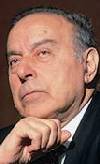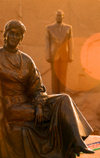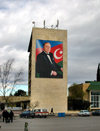 Heydar
Aliyev
Heydar
Aliyev
Contents |
Aliyev's career in the Soviet era
 Aliyev
obscured much of his early life, and details remain uncertain. He claimed
to have been born into a working-class family in the Azerbaijani province
of Nakhchivan,
but other sources suggest he was actually born in Armenia.
Doubt also exists over his date of birth. He also claimed to have studied
at the Azerbaijan State University in Baku,
graduating with a degree in history. It seems, however, that he actually
attended the Ministry of State Security Academy in Leningrad.
Aliyev
obscured much of his early life, and details remain uncertain. He claimed
to have been born into a working-class family in the Azerbaijani province
of Nakhchivan,
but other sources suggest he was actually born in Armenia.
Doubt also exists over his date of birth. He also claimed to have studied
at the Azerbaijan State University in Baku,
graduating with a degree in history. It seems, however, that he actually
attended the Ministry of State Security Academy in Leningrad.
He joined the Azerbaijani Committee of State Security (the KGB) in 1944. He worked his way up through the ranks, becoming its deputy chairman in 1964 and chairman in 1967. Two years later, in 1969, Leonid Brezhnev's administration appointed Aliyev to the post of First Secretary of the Central Committee of the Azerbaijani Communist Party. He also became a candidate (non-voting) member of the Soviet Politburo in 1976. He occupied this position until December 1982 when Yuri Andropov promoted him to the post of first Deputy Prime Minister of the Soviet Union. Aliyev thus became the first Muslim full member of the Politburo. He took up responsibility for transport and for social services.
His star waned following the appointment
in 1985 of Mikhail Gorbachev as Soviet leader. His political views became
a liability in the era of
perestroika. His fall from grace became
public when the state newspaper
Pravda attacked him for corruption,
with critics labeling him "one of the great Communist dinosaurs." In October
1987, Gorbachev mounted a clear-out of the Brezhnevite old guard and forced
Aliyev to resign from the Politburo and as head of the Azerbaijan Communist
Party "for reasons of health".
Fall and re-invention
Aliyev returned to his native Nakhchivan in 1990. He re-invented himself as a moderate nationalist, resigning from the Communist Party in ostensible protest against the violent Soviet suppression of demonstrations in Baku in January 1990. He was subsequently won election as a deputy in the Azerbaijani legislature and in 1991 gained the appointment of Chairman of the Supreme Majlis [Council] of the Nakhchivan Autonomous Republic. Azerbaijan declared its independence from the Soviet Union on August 30, 1991, though it did not receive formal recognition of its new status until the USSR dissolved in December that year.The period immediately after the declaration of independence proved a troubled one for Azerbaijan, which became locked in a bloody conflict with Armenia over the Armenian-populated enclave of Nagorno-Karabakh. The Azerbaijani president, Abulfaz Elchibey, turned in 1992 to Aliyev to bolster a weak and ineffective government, appointing him to the post of Deputy Chairman of the Supreme Council of Azerbaijan.
By 1993, Azerbaijan had descended into
chaos and seemed on the verge of a civil war, following disastrous military
defeats inflicted by the Armenians. Echibey had to flee the capital in
June following an attempted
coup d'état. Aliyev became
acting president and, as part of a deal with the coup leaders, gained appointment
as the Chairman of the Supreme Council of Azerbaijan on June 15. The National
Assembly elected him as President nine days later.
Aliyev as President
Over the course of the subsequent decade, Aliyev ruled his country with a firm hand, encouraging foreign investment while discouraging political dissent. He twice ran and won the presidency of Azerbaijan in national elections (held in the October of 1993 and the October of 1998), but international observers regarded neither election as free or fair.Aliyev had considerable success at attracting multinational companies to invest heavily in Azerbaijan's oil industry, which controlled large oil and gas reserves under the Caspian Sea but had suffered poor management in Soviet times. In 1997 President Aliyev signed a huge contract with the international oil consortium AIOC. He also acted as one of the driving forces behind the controversial multi-billion dollar project to build an oil pipeline from Baku to Ceyhan in Turkey, via neighboring Georgia (thus bypassing Russia to the north and Iran, much to those countries' displeasure).
However, mismangement corruption flourished under Aliyev's decade of autocratic rule and Azerbaijan gained an unenviable reputation as one of the most corrupt countries in the world. Aliyev and his son, Illham both stood accused of personally skimming off huge sums of oil revenue, leading to some describing the country as a kleptocracy.
He also tried but failed to resolve the Nagorno-Karabakh crisis, attempting a military solution in December 1993 that eventually resulted in an estimated 30,000 deaths and the displacement of a further 750,000 Azeris. The issue remains unresolved, with Armenian rule continuing in Nagorno-Karabakh and Azerbaijan still hosting several hundred thousand refugees.
In 1995 assassins tried to kill Aliyev in retaliation for his attempts to clean up the Turkish casino influence in Azerbaijan. The authorities never captured the would-be assassins, who presumably included Abdullah Catli.
 Aliyev's
health began to fail in 1999, when he had a major heart bypass operation
in the United States. He later had prostate surgery and a hernia operation.
He suffered a collapse while giving a speech on live television in April
2003. On August 6, Aliyev returned to the United States for treatment for
congestive heart failure and kidney problems. He stood down from the presidency
at the start of October 2003, but in an extremely controversial move appointed
his son Ilham as
his party's sole presidential candidate.
Aliyev's
health began to fail in 1999, when he had a major heart bypass operation
in the United States. He later had prostate surgery and a hernia operation.
He suffered a collapse while giving a speech on live television in April
2003. On August 6, Aliyev returned to the United States for treatment for
congestive heart failure and kidney problems. He stood down from the presidency
at the start of October 2003, but in an extremely controversial move appointed
his son Ilham as
his party's sole presidential candidate.
Ilham Aliyev duly won the presidential
election of October 15, 2003 but international observers again criticised
the contest as falling well below expected standards. This transfer of
power became the first case of top-level dynastic succession in the former
Soviet Union. Only two months into Ilham Aliyev's presidency, his father's
death on December 12 marked the end of an era in Azerbaijani politics.
 Aliyev
in the Tomb
Aliyev
in the Tomb
After his death there is still no rest
for Heydar Aliyev. In the best North Korean style he has been appointed
"National leader of Azerbaijan". His son's regime has used and abused him
to try to get some ligitimacy that seemed to be lacking from the polls.
This has taken meany shapes: museums everywhere like Ataturk, thousands
of statues like the Turkmenbashi and father and son portraits like Kim
Il Sung and Kim Young Il. (Lately he is even supposed to have performed
a few miracles - maybe aspiring to become a Muslim Haile Selassie?). The
oil revenue funds the 'Heydar Aliyev Foundation' which is run by Mehriban
Aliyeva and specializes in this propaganda business. Hyedar and his
wife Zafire are buried at the 'Honour cemetery', behind him is a large
stone map of Azerbaijan - though the country he left when he went to meet
his maker was about 20% smaller...
Partly From Vikipedia, the free encyclopedia - GNU Free Documentation License